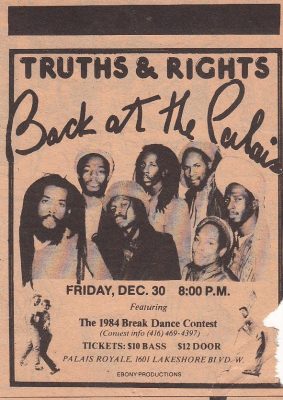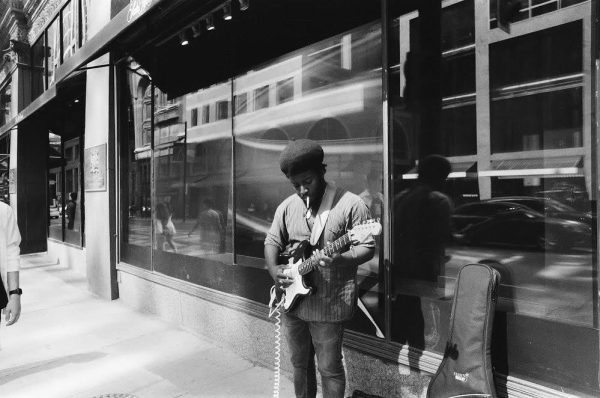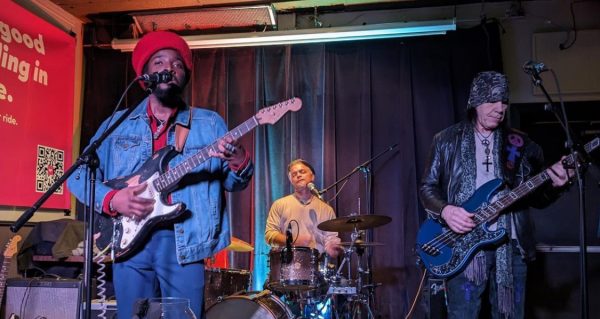
What initially drew you to the blues genre, and how did you get started in music?
“I was initially drawn to the Blues due to my Father showing me cats like Buddy Guy, B.B. King & Jimi Hendrix. My introduction to music was again due to my father who was a formative roots musician in Toronto. This was in the late 70’s & early 80’s with his band ‘Truths and Rights’, these were militant Pan-African and Rasta brothers who immigrated to Toronto (Regent Park) from the Caribbean.
They weren’t afraid to speak about the Black experience in the form of protest songs at a time when there was a lot of tension in the city. This was my introduction to music and some of the earliest songs I can recall hearing came from these guys. Songs like “Black Plight”, “Acid Rain” & “Metros N.1 Problem”. This gave me a strong sense of pride in playing Roots music. Blues is just a branch of this huge catalog of Roots music cultivated by the African Diaspora.”

Who were your biggest influences as a musician, and how have they shaped your style?
“I would say, so far as electric Blues, if I had to isolate 3 of my main influences. It would be Buddy Guy, Freddie King & Jimi Hendrix that really influence my playing style. I try to emulate Buddy when it comes to my singing a lot, although I don’t have his vocal range. I base a lot of my lead and rhythm playing on these cats as well. I also listen to Blues from its conception all the way to the present, so folks like Charley Patton, Blind Boy Fuller, Memphis Minnie, Mississippi John Hurt, etc. All the way to the present day and everything in between including the genres informed by the Blues Jazz, Soul, RnB, Funk, Rock. You name it.”
The blues often delves into personal experiences and emotions. How do you connect with and convey those feelings through your music?
“I really just try to keep it authentic. The Blues is a very visceral genre, it’s not to be sang frivolously, I don’t just sing it because I think it sounds cool or I idolize the pain and trauma it comes from, I’ve really lived the Blues to the fullest. I think my life experience has really allowed me to sing the Blues as authentically as possible. I’ve done a lot of living to be 26 and almost dying, but that’s a story for another time.”

In what ways do you think the blues continues to resonate with audiences today?
“I think the Blues is raw and unfiltered a lot of the time when it’s done right; not to be mistaken with the concept of it being ‘easy to play’. That feeling and passion is usually felt by an audience that still values those things. It’s really not about flash and frills, which makes it relatable to the average listener. It speaks about problems that in some ways many people can relate to.”
How do you see the role of the blues in preserving cultural heritage and telling important stories?
“The Blues has always been a form of aural history. When you think about it, it was almost a form of code switching. You talk about ‘Hellhounds’ being on your trail, any basic knowledge of American history will tell you what that is likely a reference to. Folks like Big Bill Broonzy taking a Gospel song like ‘This Train’ and adding lyrics such as ‘this train don’t fit no transportation, no Jim Crow and no discrimination’. It’s extremely important for people to go back and deeply dissect the local history of these formative Blues songs, Delta Blues and various Country Blues from the south. A lot of the meaning is being missed nowadays. Guys like Mississippi Fred McDowell talking about ‘Levee camp Blues’ and being a ‘long line Mule Skinner’, these are things that people do not understand unless they’ve done the historical reading to understand the colloquialisms of the time. This knowledge makes listening to the Blues more enjoyable because it’s no longer mysterious, you begin to paint a picture of what was going on along side the music, it serves as pleasure and a way of learning unfiltered African American History”

Can you speak to the challenges and triumphs you’ve faced as a artist in the blues genre?
“I started out playing the Blues in the streets of Toronto and on the Subway (without a license) and I’ve been so lucky to have so many doors open because of it. There haven’t been so much ‘challenges’ as lessons. Whatever comes I’m just honoured to be on the ride. I’ve had the chance to share the stage with people that toured and preformed with my heroes such as Jerome Tucker, Terry Wilkins, Carl Harvey, Bucky Berger, they’ve become mentors of sorts. Local musical legends like Andrea Dibitonto, Mike Sedgewick, Frank Constantino, Tex Bach, Tom Bona, Tim Gittens, Juliet Ann, Paul Renaud, Paul Domanski, Sandra Bouza, Little Magic Sam Band, Fabio Dwyer, Mike Nagoda. These people have really become my friends and have made me feel welcomed and at home in the Toronto Blues scene.”
What do you hope listeners take away from your music, especially those who might be new to the blues?
“I hope they hear the emotion. The songs I sing are not always my own but they are always sang and played from the heart. I used to be scared to play music when I was going through heavy emotions y’know, I thought it’d taint my happy place.. now I just play and sing no matter what and let the joy or pain be reflected in my art. Life has not always been easy for me and at this point I hope that people will take my music as a signal that it’s okay to go through those Blues and let them wash over you like a wave, and come out on the other side feeling stronger.”
Can you share any upcoming projects or performances that fans can look forward to and what can they do to support you?
“I’ve got an album brewing with my band ‘The Jay Blues Trio’ which will be a debut album for us. I’m pretty green on the scene y’know. I’ll be at ‘The Cameron House’ March 14th doing a late show 10pm – closing, where I’ll be announcing more gigs once they’ve been confirmed.
Folks can follow me on instagram for more info and just to get to know me @BluesForJ.
People can support me and every musician by getting off the internet and going out to your local venue to listen to some live music, pay as much as you can and have fun, don’t let your attention span be eroded by the instant gratification of 30 second clips on social media, everything is better live and direct. Peace and Maximum Love!”

Yugbodh (YB) is a contributing writer at Onside Media, he skillfully weaves captivating stories. For him music and movies serves as an escape, and he finds them fascinating as they constantly evolve. If you have interesting tales to share, feel free to reach out via email at: info@theonside.com





